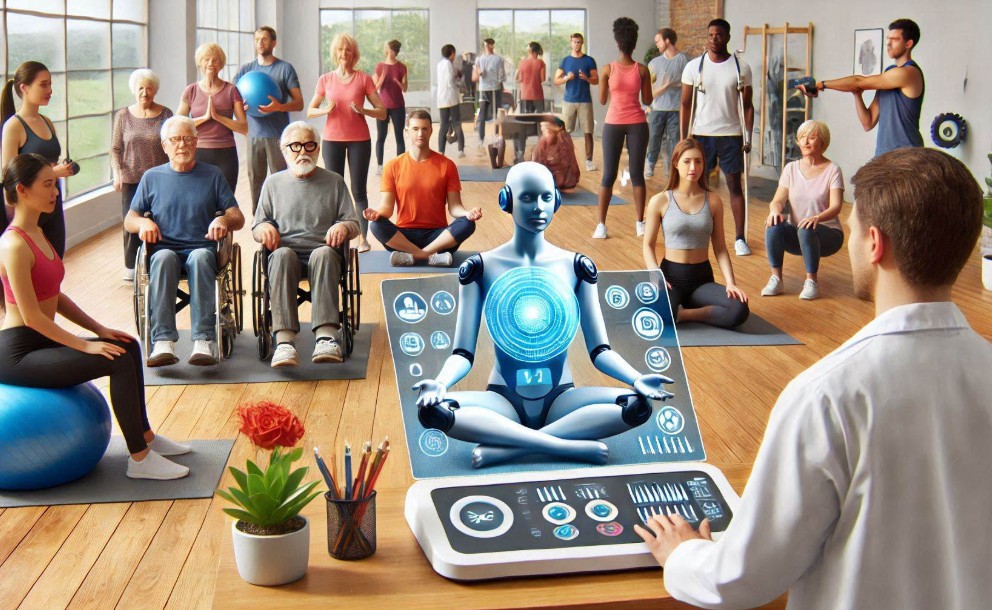In recent years, there has been a significant advancement in the field of Artificial Intelligence (AI) and Augmented Reality (AR). These technologies have become increasingly popular and have the potential to enhance virtual experiences in various fields such as gaming, education, healthcare, and...
Virtual AI Trainer Creates Personalized Rehabilitation Programs

In recent years, advancements in technology have revolutionized the way we approach physical recovery and rehabilitation. The integration of artificial intelligence into this field has opened up new possibilities for customized healing journeys. By leveraging data and smart algorithms, innovative systems are now able to offer individual support based on each person's unique needs.
These intelligent systems work by analyzing a variety of factors, such as the patient's health history, current condition, and goals. The result is a recovery plan that adapts in real-time, ensuring that every step of the process is aligned with the specific requirements of the individual. This personalized approach increases effectiveness and accelerates progress.
Through the use of advanced AI tools, people can now access optimized recovery strategies that would have been difficult or impossible to create manually. The technology ensures continuous monitoring and adjustment, making the rehabilitation process more efficient and successful than ever before.
How AI Transforms Rehabilitation Programs
Artificial intelligence has significantly reshaped the way recovery processes are designed and managed. With the ability to analyze vast amounts of data, AI offers a level of precision and adaptability that traditional methods cannot match. This transformation enables better-targeted strategies that enhance healing and improve outcomes for individuals at every stage of their recovery journey.
By continuously monitoring a patient's progress, AI-driven systems can adjust plans in real-time to optimize recovery. These systems can track performance metrics, identify trends, and suggest adjustments to activities, ensuring that the individual receives the most effective treatment at any given moment. Such dynamic support allows for more efficient and faster healing, reducing the risk of complications or setbacks.
Moreover, AI's ability to tailor recovery strategies based on specific goals and conditions provides an unprecedented level of customization. It empowers healthcare professionals to offer more effective guidance, while individuals experience a higher degree of engagement and confidence in their recovery process.

Benefits of Personalized AI-Driven Recovery Plans
AI-driven solutions have revolutionized the way recovery strategies are tailored to individual needs, offering a more efficient and adaptive approach. These intelligent systems harness data to craft recovery pathways that align with specific health conditions, goals, and progress. As a result, patients can experience a higher level of care, precision, and engagement throughout their healing journey.
One of the most significant advantages is the ability to adjust plans in real time. AI monitors progress and identifies key metrics, allowing it to make immediate changes based on the individual’s recovery status. This ensures that each phase of the recovery process is as effective as possible, minimizing unnecessary delays and optimizing results.
Furthermore, AI-powered recovery solutions allow for continuous improvement by learning from each interaction. The system can refine its recommendations over time, ensuring that the plan remains relevant and aligned with the patient’s evolving needs. This flexibility helps in achieving more consistent and faster recovery compared to traditional, one-size-fits-all methods.
AI's Role in Accelerating Physical Rehabilitation
Artificial intelligence has become an essential tool in speeding up recovery and enhancing the effectiveness of physical therapy. By analyzing data from various sources, AI can provide real-time insights into a patient's condition, allowing for quicker adjustments to recovery plans. This adaptability ensures that each step of the process is optimized for the individual’s needs, leading to faster progress and improved results.
AI systems also help by identifying patterns that might be missed in traditional recovery methods. These technologies can predict potential setbacks and suggest preventive measures, reducing the risk of injuries or delays in healing. With continuous monitoring, AI enables healthcare providers to address issues promptly, ensuring that the path to full recovery is as smooth and efficient as possible.
Furthermore, AI’s ability to offer continuous support throughout the recovery journey ensures that patients stay engaged and motivated. By providing regular feedback and tracking progress, these systems help individuals remain on track with their goals, accelerating their recovery and boosting overall well-being.



